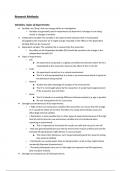Lecture notes
Research Methods
- Module
- Research Methods
- Institution
- AQA
Involves notes on: - Variables, Types of Experiments - Control of Variables - Observation and Self-Report Techniques - Correlations, Aims, and Hypotheses - Sampling, Design, and Data - Ethics - Probability and Significance - Distributions - Content Analysis Involves strengths and weakness...
[Show more]



